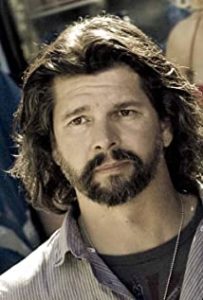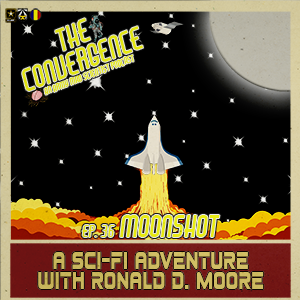“The only way of discovering the limits of the possible is to venture a little way past them, into the impossible.” — Sir Arthur C. Clarke, 20th Century British science fiction writer, futurist, and inventor
[Editor’s Note: Mad Scientist is pleased to introduce a new series of The Convergence podcast interviews with writers, creators, and producers who have a wealth of knowledge and experience in envisioning the future in diverse and unique ways! Creative writing and narrative building helps us to explore how emergent technologies and other capabilities could be employed and operationalized. Today’s post highlights key points from our interview with Ronald D. Moore — award winning screenwriter and producer of the several science fiction, fantasy, and alternative history television shows — in the first of our special series of podcasts exploring the power of science fiction, the importance of storytelling, and the significance of imagination — Read on!].
[If the podcast dashboard is not rendering correctly for you, please click here to listen to the podcast]
 Ronald D. Moore is a multiple Emmy and Hugo award-winning screenwriter and producer for Star Trek: The Next Generation; Star Trek: Deep Space Nine, the re-imagined Battlestar Galactica (for which he also won a Peabody award), the Outlander historical fantasy series, Philip K. Dick’s Electric Dreams, and the For All Mankind streaming series portraying an alternative history featuring an enduring American/Soviet Space Race after the Russians beat us to the Moon.
Ronald D. Moore is a multiple Emmy and Hugo award-winning screenwriter and producer for Star Trek: The Next Generation; Star Trek: Deep Space Nine, the re-imagined Battlestar Galactica (for which he also won a Peabody award), the Outlander historical fantasy series, Philip K. Dick’s Electric Dreams, and the For All Mankind streaming series portraying an alternative history featuring an enduring American/Soviet Space Race after the Russians beat us to the Moon.
In today’s podcast, Mr. Moore discusses creativity, the power of science fiction in exploring future technologies, the importance of storytelling and narrative, and the significance of imagination in formulating fresh perspectives about future possibilities. The following bullet points highlight key insights from our discussion:
-
-
- Thinking about the future involves both world-building and storytelling. To do this process successfully, futurists must first identify constants and relevant social elements (e.g., religion, government structure, culture) for the desired time period. Then, one can consider key changes in the time period, and think through their second and third order impacts on the society being discussed.
-
-
-
- By harnessing the powerful process of developing science fiction narratives, the U.S. military can develop and prepare for alternate futures in the operational environment. These narratives can help communicate complex and abstract ideas in concrete ways and provide Army leaders with explicit examples of problems they may encounter in the future.
-
-
-
- Sharing stories and thinking critically about the future not only allows us to prepare for it, but inspires us to be involved in its creation. Science fiction has inspired generations of scientists and explorers, and created ambition to travel to new worlds. It is important to incentivize this innovative spirit, given that progress is not inevitable.
-
-
-
- Science fiction and futurist thinking can also help the U.S. military consider ethical implications of technology development. Creating and sharing stories about technology use can help contextualize the impact of research and development on human society.
-
-
-
- Competition among great powers is inevitable. It is important to recognize the impact that national prestige plays in predicting the actions of our competitors. For instance, the Space Race was an extraterrestrial extension of the Cold War competition between the U.S. and the Soviet Union, driven largely by each side’s desire to showcase the exceptionalism of their respective political and economic systems for international acclaim. Narrative is a key component of soft power influence, for both domestic and international audiences.
-

Stay tuned to the Mad Scientist Laboratory for our next episode of “The Convergence,” featuring our interview with proclaimed Mad Scientists Peter W. Singer and August Cole — co-authors of the sci-fi techno thrillers Ghost Fleet: A Novel of the Next World War and Burn-In: A Novel of the Real Robotic Revolution — in the second of our special series of podcasts exploring the power of science fiction, the importance of storytelling and narrative, and the significance of imagination.
If you enjoyed this post, check out the following related content:
“Dark Side of the Moon” in “The Queue” Redux!
The Future Operational Environment: The Four Worlds of 2035-2050
Envisioning Future Operational Environment Possibilities through Story Telling
Critical Projection: Insights from China’s Science Fiction, by Lt Col Dave Calder, British Army
Takeaways from the Mad Scientist Science Fiction Writing Contest 2019 and the winning submission, AN41, by proclaimed Mad Scientist COL Jasper Jeffers
The Convergence: Reading and Leading in the Future, and the associated podcast
Sine Pari, by proclaimed Mad Scientist Howard R. Simkin



